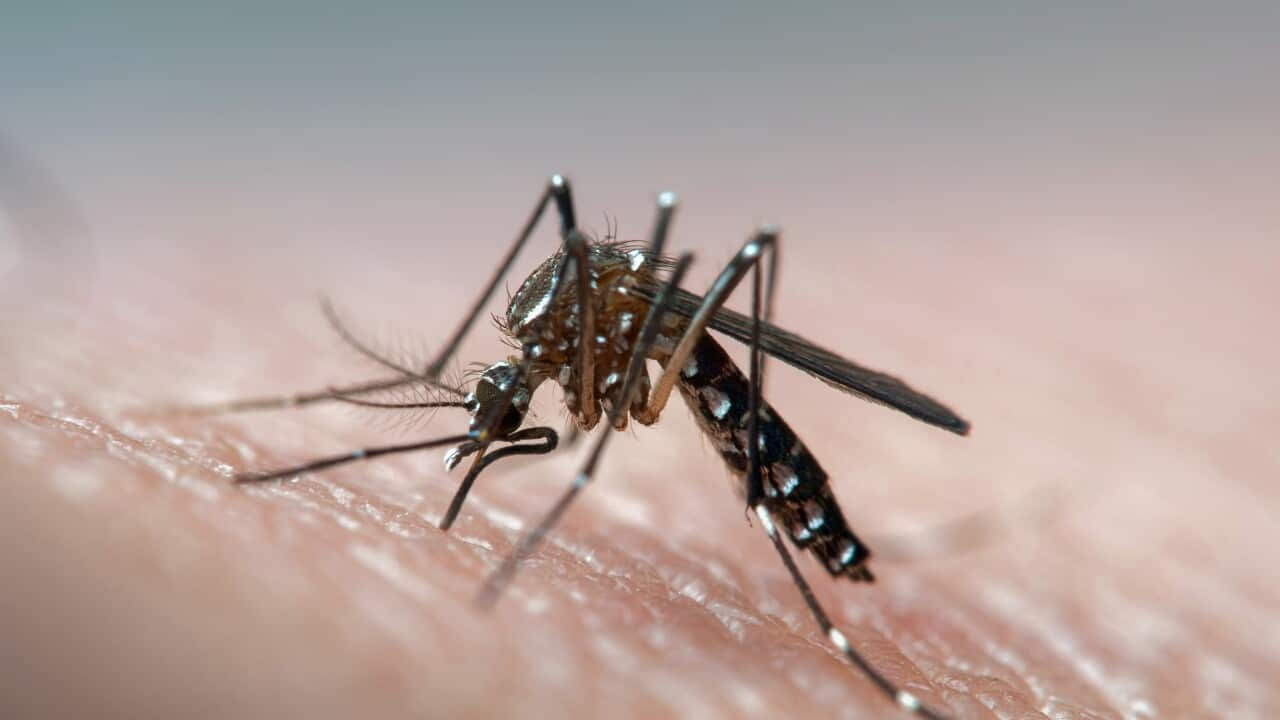KEY POINTS
- La Niña has increased the likelihood of more mosquitoes in parts of the country.
- Some people are more prone to bites than others, according to research.
- If you're out of repellent, there are other options to ensure you don't get bitten.
You're not just imagining it: if you're more prone to get bitten than others around you by mosquitoes, it's probably because you're more attractive to them.
And it all comes down to what's on your skin.
Research shows that because of differences in the odour of their skin, caused by organic compounds known as carboxylic acids. People who have more carboxylic acids are more enticing for mosquitoes.
Associate Professor Cameron Webb from the University of Sydney and NSW Health Pathology, has spent his career studying the relationship between insects and humans.
He said it comes down to what the mosquitoes can smell.
"We know that some people are more likely to get bitten by mosquitoes than others, and we think it comes down to the smell their skin," he told SBS News.

Dr Cameron Webb is a scientist in medical entomology and says this summer is going to be great weather for mozzies.
Prepare for more mosquitoes with La Niña
Mosquitoes are reliant on water to complete their life cycle.
The return of the La Niña weather pattern will see a wetter spring and summer in many parts of Australia.
Dr Webb said there are two ingredients that contribute to a big boom in mosquito numbers: water and warmth.
"We've got lots of water across the environment due to recent flooding. It provides ideal conditions for mosquitoes and as we head into summer, and the temperatures warm up, we can only expect mosquito populations to increase and their likely to persist throughout the summer," he said.
In the central west of NSW where flooding has occurred, a swarm of mosquitoes was captured flying around a woman's front porch.
Dr Webb said it was unlikely there would be more scenes like this on the east coast of Australia, even though mosquito season is in full swing.
"The mosquito populations in inland areas of New South Wales are directly linked to the recent flooding, we're probably not likely to see such large numbers of mosquitoes in coastal regions but that doesn't mean that there won't be mosquitoes around as the weather warms up," he said.
Why you shouldn't be complacent about mosquito bites
Dr Webb said no matter where you are around the country, it's important to take steps to avoid mosquito bites.
"It's important to take steps to protect yourself, as some mosquitoes can carry blood-borne viruses," he said.
If the fact that it's more likely there will be more mosquitoes around isn't enough to have you reaching for the repellent, the prevalence of along the Murray River could.
LISTEN TO

What is Japanese encephalitis and what risk does it pose in Australia?
SBS News
11/03/202202:42
JE is a viral brain infection that's spread through mosquito bites and there currently isn't a cure.
But you can protect yourself with a vaccine.
"This year we are really concerned about JE, consult your local health authorities about how to accessing this vaccination and whether you are eligible," Dr Webb said.
What happens if repellent runs out?
In flood-ravaged NSW, there have been reports of swarms of mosquitoes. To make matters worse, some isolated communities have run out of insect repellent.
If you've left your repellent at home or have run out, the next best option, according to Dr Webb, is to cover your skin with loose-fitting clothing.
"If you don't have insect repellent, the next best thing you can do is to cover up ... and if you're going into bushland or into wetlands it's a good idea to stay away from active wear, as some mosquitoes can penetrate the skin through tight-fitting clothing."
There have also been other suggestions that eucalyptus oil and lavender oil can also act as repellents.
But Dr Webb says while they are an option, their protection isn't strong and doesn't last long.
"You can't just reach for essential oils to provide protection against biting insects, you should choose insect repellents that are registered by the Australian Pesticides and Veterinary Medicines Authority," he said.
NSW Health also advises people to remove items that can collect water outdoors where mosquitoes can breed, improve drainage, and use insecticide sprays, vapour dispensing units and mosquito coils.










